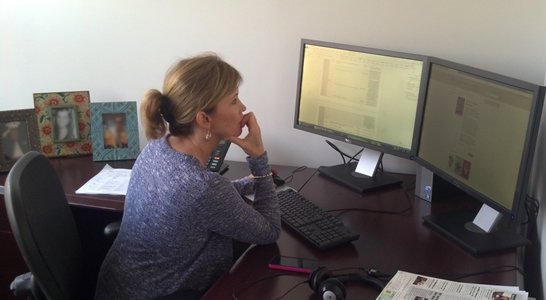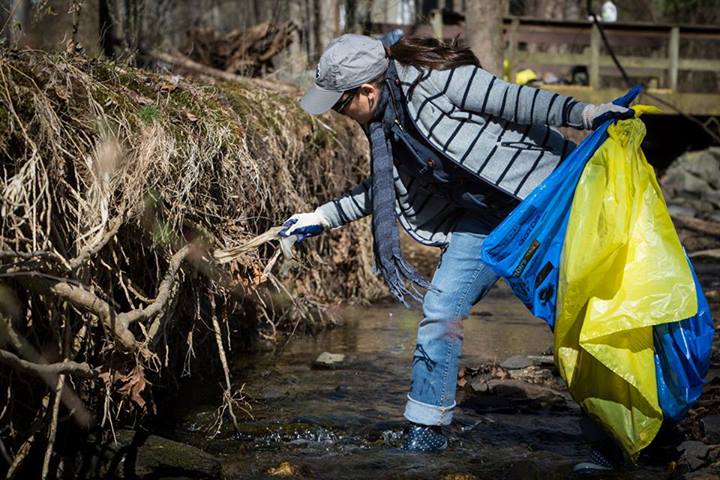In order to ensure that Mason’s online programs and courses maintain the same academic rigor and integrity as their campus-based counterparts, the Office of Distance Education (DE) has developed a comprehensive readiness and review process for newly developed online courses. As Assistant Director for Quality Assurance, Dr. Kat Hitchcock continuously strives to invigorate and improve this process.
With an extensive background in distance education instruction and administration, Kat is uniquely qualified to coordinate DE’s efforts to support faculty and departments in achieving the shared goal of building and maintaining excellent, high quality online courses and programs.

Photo courtesy of Katherine “Kat” Hitchcock, Assistant Director for Quality Assurance.
Supporting Collaboration during Development
The process for preparing a course for online delivery typically lasts three semesters, so DE is always in an open phase of Proposal, Production, Pilot, and Portfolio. Once a course is selected for online implementation, DE hosts Orientations and Kick-off meetings that provide an introduction to available services.
One of the key resources provided, each faculty member is paired with a designated Division of Instructional Technology (DoIT) instructional designer (ID) who provides one-on-one help throughout the entire Production phase.
Measuring Comparability and Effectiveness
Six weeks prior to the Pilot phase—the course’s first semester online—faculty members participate in a Readiness Assessment, providing a finished syllabus and exhibiting 60% course completion within Blackboard. Once this step is achieved, the Pilot phase gives faculty the opportunity to gain an initial feel of how the course will function and how teaching styles may differ in an online setting.
Following the Pilot semester, courses undergo a Portfolio Review to determine what worked, what didn’t, and how to move forward in a beneficial and successful way. Kat explains, “The portfolio process measures effectiveness and comparability.”
Mirroring that of the Office of Institutional Assessment, this process is used not only for accreditation purposes but also to ensure comparability between Mason’s online and face-to-face courses. The Portfolio Review also serves as a useful and informative opportunity for DE to engage with faculty and ensure an adequate and rewarding approach to online education.
Incorporating Faculty Feedback in Improvement Efforts
Though a recent addition to the DE team, Kat has already implemented updates to the review process to streamline functionality and support continuous improvement. A useful tool for gaining faculty perspective on and suggestions for the entire development and delivery process, Kat now includes a faculty survey as part of the Portfolio Review phase.
Survey questions range from opinions on the overall process to particular aspects of individual phases. One Production question asks faculty to share thoughts about the experience of collaborating closely with an ID. Another question, targeting the Pilot phase, asks what training may prove helpful for future semesters that was not available or obtained at the time of the pilot.
While it is an ongoing effort to modify and maintain an ideal process, Kat finds that many of the faculty members she works with consider the experience of teaching online to be rewarding.
“So much effort goes into ensuring engaging discussions, creating intriguing assignments, and providing relevant resources that the online course is often exceptional in comparison to its face-to-face counterpart,” she shares. “Some professors are even flipping their classrooms to be more similar to the online format—providing videos and assignments online while utilizing classroom time to hold in depth discussions.”
Meet the Assistant Director for Quality Assurance

Photo courtesy of Kat Hitchcock.
With over 14 years of experience in distance education instruction and administration, Dr. Kat Hitchcock has an extensive background spanning public, for-profit, 2-year, and 4-year institutions.
Her administrative responsibilities have encompassed ensuring quality in online course design and delivery, developing policy and practice for online programs, facilitating online student services and support, and creating and managing faculty support services and development opportunities. She is also certified by Quality MattersTM as an Online Facilitator and Peer Reviewer.
Before joining Mason, she served as Director for Excellence in Online Instruction for the Extended Learning Institute, Northern Virginia Community College’s distance education department.
Dr. Hitchcock has also served as undergraduate faculty in Psychology for University of Maryland University College, Embry-Riddle Aeronautical University, Northern Virginia Community College, and Kaplan University. She teaches a range of topics including biological clusters, cognition and perception, and cognitive psychology.
Learn More About Online Education
The Office of Distance Education (DE) is committed to offering innovative and high quality distance education programs that meet the needs of Mason’s diverse student body. Through a variety of instructional technologies, online courses provide active and collaborative learning environments that enhance learning while allowing students greater flexibility with academic schedules.
Interested in online education at Mason? Visit masononline.gmu.edu or contact [email protected] for more information!

